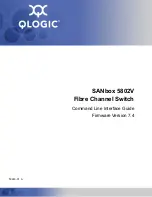
DGS-3312SR Layer 3 Gigabit Switch
73
config stp ports
Purpose
Used to setup STP on the port level.
Syntax
config stp ports <portlist> {externalCost [auto | <value 1-
200000000>] | hellotime <value 1-10> | migrate [yes | no] |
edge [true | false] | p2p [true | false | auto ] | state [enable |
disable]
Description
This command is used to create and configure STP for a group of
ports.
Parameters
<portlist>
−
Specifies a range of ports to be configured. The port
list is specified by listing the lowest switch number and the
beginning port number on that switch, separated by a colon. Then
the highest switch number, and the highest port number of the
range (also separated by a colon) are specified. The beginning
and end of the port list range are separated by a dash. For
example, 1:3 specifies switch number 1, port 3. 2:4 specifies
switch number 2, port 4. 1:3-2:4 specifies all of the ports between
switch 1, port 3 and switch 2, port 4
−
in numerical order.
externalCost
−
This defines a metric that indicates the relative cost
of forwarding packets to the specified port list. Port cost can be set
automatically or as a metric value. The default value is
auto
.
auto
– Setting this parameter for the external cost will
automatically set the speed for forwarding packets to the specified
port(s) in the list for optimal efficiency. Default port cost: 100Mbps
port = 200000. Gigabit port = 20000.
•
<value 1-200000000>
- Define a value between 1 and
200000000 to determine the external cost. The lower
the number, the greater the probability the port will be
chosen to forward packets.
hellotime <value 1-10>
−
The time interval between transmission
of configuration messages by the designated port, to other
devices on the bridged LAN, thus stating that the Switch is still
functioning. The user may choose a time between 1 and 10
seconds. The default is 2 seconds.
migrate [yes | no]
– Setting this parameter as “
yes
” will set the
ports to send out BDPU packets to other bridges, requesting
information on their STP setting If the Switch is configured for
RSTP, the port will be capable to migrate from 802.1d STP to
802.1w RSTP. If the Switch is configured for MSTP, the port is
capable of migrating from 802.1d STP to 802.1s MSTP. RSTP
and MSTP can coexist with standard STP, however the benefits of
RSTP and MSTP are not realized on a port where an 802.1d
network connects to an 802.1w or 802.1s enabled network.
Migration should be set as
yes
on ports connected to network
stations or segments that are capable of being upgraded to
802.1w RSTP or 802.1s MSTP on all or some portion of the
segment.
edge [true | false]
–
true
designates the port as an edge port.
Edge ports cannot create loops, however an edge port can lose
edge port status if a topology change creates a potential for a
loop. An edge port normally should not receive BPDU packets. If a
BPDU packet is received it automatically loses edge port status.
false
indicates that the port does not have edge port status.
p2p [true | false | auto]
–
true
indicates a point-to-point (P2P)
















































